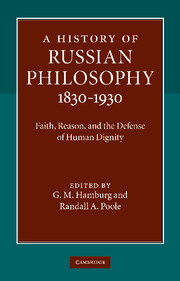Book contents
- Frontmatter
- Contents
- List of contributors
- Acknowledgments
- Introduction: The humanist tradition in Russian philosophy
- I The Nineteenth Century
- 1 Slavophiles, Westernizers, and the birth of Russian philosophical humanism
- 2 Alexander Herzen
- 3 Materialism and the radical intelligentsia: the 1860s
- 4 Russian ethical humanism: from populism to neo-idealism
- II Russian Metaphysical Idealism in Defense of Human Dignity
- III Humanity and Divinity in Russian Religious Philosophy after Solov′ëv
- IV Freedom and Human Perfectibility in the Silver Age
- V Russian Philosophy in Revolution and Exile
- Afterword: On persons as open-ended ends-in-themselves (the view from two novelists and two critics)
- Bibliography
- Index
3 - Materialism and the radical intelligentsia: the 1860s
Published online by Cambridge University Press: 05 June 2012
- Frontmatter
- Contents
- List of contributors
- Acknowledgments
- Introduction: The humanist tradition in Russian philosophy
- I The Nineteenth Century
- 1 Slavophiles, Westernizers, and the birth of Russian philosophical humanism
- 2 Alexander Herzen
- 3 Materialism and the radical intelligentsia: the 1860s
- 4 Russian ethical humanism: from populism to neo-idealism
- II Russian Metaphysical Idealism in Defense of Human Dignity
- III Humanity and Divinity in Russian Religious Philosophy after Solov′ëv
- IV Freedom and Human Perfectibility in the Silver Age
- V Russian Philosophy in Revolution and Exile
- Afterword: On persons as open-ended ends-in-themselves (the view from two novelists and two critics)
- Bibliography
- Index
Summary
Materialism, or the philosophical proposition that the world consists entirely of matter, has existed since the ancient Greeks. The implications of this proposition, however, have changed considerably over time. In Russia in the late 1850s and early 1860s, radicals were principally interested in the consequences of materialism for theories of the way the mind operates. Contradicting Christian conceptions, they argued that there is no such thing as an immortal soul, responsible for all thoughts and decisions and capable of exercising free will. Nor, they claimed, are there any innate ideas. All thoughts are the results of sensory stimuli, formed into perceptions and ideas inside an entirely material mind.
These assertions were based on scientific theories that were still controversial in the mid-nineteenth century. Even so, Russian radical journalists elevated materialism to the status of a worldview that contained the answers to the country's most pressing political and social problems. The sweeping nature of their claims led the conservative critic Mikhail Katkov (1818–1887) to denounce materialism as a new “religion” in 1861, a view famously repeated by the philosopher Nikolai Berdiaev in the early twentieth century.
From 1858, the two leading radical journals, The Contemporary and The Russian Word, became synonymous with materialism. It was not long, however, before some radical writers began to voice significant doubts about their religion.
Keywords
- Type
- Chapter
- Information
- A History of Russian Philosophy 1830–1930Faith, Reason, and the Defense of Human Dignity, pp. 69 - 89Publisher: Cambridge University PressPrint publication year: 2010
- 2
- Cited by

